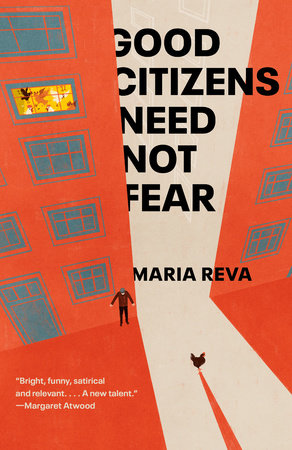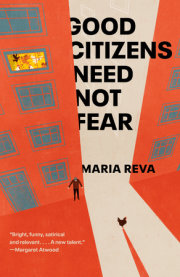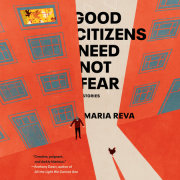BONE MUSIC
The first time Smena’s neighbor knocked on her door, she asked to borrow cloves. The woman stood in Smena’s doorway, clutching a canvas sack to her chest. Her diminutive frame barely reached the latch. “I’ll bring the cloves back,” she promised. “You can reuse them up to three times.”
This neighbor, Smena knew, associated with the building’s benchers. The woman never sat with them but did spend a good deal of time standing beside them, cracking sunflower seeds, no doubt gossiping, and Smena would often hear the metallic clang of her laughter through the bedroom window. Smena had placed the woman in her mid-sixties, around Smena’s age, but up close her wet lips and bright caramel eyes made her look younger. Her cropped hair, dyed bright red, reminded Smena of the state-made cherry jam she used to see in stores.
She did not let the neighbor in, but made sure to leave a crack between the door and its frame so as not to shut it in the woman’s face—word got around if you were rude, especially to a bencher or bencher affiliate. Smena rummaged in her kitchen drawers for the cloves, then continued the search in her bathroom cabinet, which contained the kitchen overflow. There, the cloves rattled inside a newspaper pouch; they’d lost their peppery tang.
Smena stepped out of the bathroom and blurted “Oi.” The neighbor was sitting in her kitchen. The woman had taken off her clogs, and a grayish middle toe poked through a hole in one of her socks.
Neighbors rarely visited each other, and if they did, it was to complain about a leak in the ceiling or to spy out who had better wallpaper and why. Smena tossed the pouch of cloves on the table, hoping the woman would take what she’d come for and leave.
“I’m Nika, from fifth,” the neighbor said. “Have a biscuit.” From her canvas sack she produced a small plastic bag, rolled down its rim, and Smena felt a pang of delight: inside were the same cheap biscuits Smena used to buy at the bazaar, the ones that had the shape and consistency of a fifty-kopek coin and had to be soaked in tea to save teeth from breaking. This gesture meant her guest wanted tea, which she, the host, should have offered long ago, upon greeting.
Nika craned her neck for a better view down the corridor. “Say, this a one-room or two-room?” Nika pronounced her words with a dawdling slur that was at odds with her quick movements. Smena wondered if the woman was recovering from a stroke.
“Two-room.”
“For one person?”
Smena tensed. Anything she said, already she could hear being repeated around the block. “My husband snored.” This was true: Smena had shared the sofa bed with her daughter, in the other room, until the girl had moved in with her fiancé’s family many towns away.
To occupy herself, Smena set the kettle on the stove. When she turned back to the woman, beside the biscuits lay a black plastic sheet. An X-ray scan. Smena recognized it instantly; she had a stack of them in the cupboard beside the refrigerator.
“I hear you make a nice ruble copying vinyl records onto X-rays,” said Nika.
Smena’s brows lifted in mock surprise. “Who told you that?”
“A friendly worm in the ground.”
“The friendly worm is mistaken.”
“I used to own a few bone albums myself, a long time ago,” Nika went on. “Only played them a couple times before they got worn through. Didn’t compare to vinyl, of course, but that’s how you got the real music.” By “real” she meant banned music. American rock ’n’ roll, decadent capitalist filth, the stuff with sex and narcotics. Smena’s specialty. She had begun copying bootlegged albums in the postwar years, when she and her husband were desperate for money and radiographic film was the cheapest, most readily accessible form of plastic. Now, with the national shortage of reel cassettes—the national shortage of everything—Smena was back in business.
“I hear your records are the best,” said Nika. “Can play for days.”
Smena hunched her shoulders in an attempt to make her broad frame appear small, innocuous. “I don’t know what you’re talking about. I’m a simple pensioner, just like you.”
“A simple pensioner like me doesn’t have a two-room all to herself.”
Smena detected judgment in Nika’s voice—it was uncouth for a woman, especially one far along in her years, to take up so much space—but also envy.
When the kettle whistle blew, Smena was wary of turning her back to the woman again; she imagined discovering a pile of X-rays, or the woman’s entire family, in the kitchen. She reached a hand behind her hips to turn off the gas, fumbled with the cutlery drawer for a spoon—then stopped. This was the same drawer that contained the lathe for engraving X-rays. Smena used her fingers to pinch tea leaves into cups, and stirred the tea by whirling each cup in a circle.
“I hope you can help me,” said Nika.
“Sugar in your tea?”
“Please. Say, ever got an X-ray done yourself?”
“Everyone has.”
“The radiation alone is enough to kill you, just slower than whatever it is they’re checking for.” Nika paused, as though waiting for Smena to say something. “What were they checking for?”
“A bout of pneumonia, a couple years ago,” said Smena, distracted. She’d remembered the sugar jar lived in the same cupboard as the record player—which was a perfectly mundane object in itself, but not if seen in conjunction with the lathe. “I forgot, I’m out of sugar.”
The two women drank their tea bitter. Smena observed that once, when Nika made to dip her biscuit, she missed the cup, tapped the table instead, noticed the error, and dipped the biscuit into her cup with vigor. Before her guest left, Smena tried to push the X-ray back into her hands, but Nika refused. “I’ll be back with your cloves,” she said from the doorway.
“Keep them.”
“You can reuse them up to three times. I read about it.”
“Keep reusing them, then.”
“Oh, I couldn’t.”
Smena forced a smile. “It’s a gift.”
“I’m the one who should be gifting you gifts, for helping me.”
“I haven’t done anything to help you.”
“But you will,” said Nika. “I can always pick out the good people. Like good watermelons.” She was about to head off at last, then paused and turned to face Smena again. “You said your husband snored. What fixed it?”
“He died.”
Nika winked. “I’m divorced, too. They say our building is cursed.”
Smena closed the door on the woman, to hide her own blush. She shoved the X-ray in the garbage bin under the sink. Her underground business made Smena vulnerable to extortion. If Nika visited again, she might ask for more than cloves.
But the X-ray did not stay in the bin long.
Smena’s worst traits, her mother had once informed her, were her height and her curiosity.
It was the golden hour, the best time of day to inspect new X-rays, when sunbeams shot directly through Smena’s kitchen window, illuminating each feathery detail of the bones. Smena lived on the tenth floor, and the neighboring building was far enough from hers for the X-ray viewings to be conducted in privacy. She secured Nika’s scan onto her window with suction cups.
The profile of a skull shone at her. The architecture of a human head never failed to shock Smena, or make her wonder how such a large bulbous weight balanced on the thin stack of vertebrae.
Smena couldn’t help but feel excitement: a head X-ray did not come her way as often as those of other body parts. And heads were the most popular with the buyers, fetched the most money. A shame she couldn’t use this one. She would not be lured into Nika’s trap.
The small white letters on the bottom right-hand corner of the film, easily overlooked by the untrained eye, read VERONIKA L. GUPKA, TUMOR. Smena noticed a thinning at the base of the skull, a shadow overtaking it from inside. The thing looked contagious, like a curse. She didn’t like the tumor hanging on her window, projecting its tendrils onto her kitchen wall.
She understood then: the woman was dying. Whatever she wanted from Smena stemmed from this fact.
Smena hid the scan, but this time, despite herself, she did not try to dispose of it.
Megadeth’s growls and screams, banned in all fifteen Soviet republics, came from Smena’s cupboard record player—at minimal volume, of course.
“I’m with the Kremlin on this one,” said Milena, Smena’s dealer. “If these are the latest tunes from the West, maybe the place really is rotting.” As usual, Milena stood leaning against the windowsill, ignoring the vacant stool in front of her. She seemed to prefer heights, like a cat, Smena had noticed.
This was their biweekly meeting. Milena brought wads of cash from selling bone albums at subway stations, public squares, and parks, and Smena counted the profit, taking the largest cut for herself. Next, Milena presented her with an array of X-ray scans procured through her job as a polyclinic custodian, and Smena picked out the most desirable designs. Today’s winning selection included a foot that had been subjected to an asphalt roller; a handsome pelvic girdle; a torso with what looked like a prominent colon but was really the spine of a fetus; a child’s hand curled into an obscene gesture.
Smena had recruited Milena because of her proximity to X-rays, but also for her proximity to Smena herself. Milena lived two doors down in a one-room she shared with her poet husband, and Smena didn’t even need to cross her own doorway to coax her neighbor in for a chat. From the first, Smena had known Milena would be perfect for the position; no one would suspect the pale middle-aged woman with drab clothes and uneven bangs of dealing illicit albums. At first Milena had refused, recounting how just last month she’d had to shake off a government lackey who had been trailing her husband, and was not sure she would be able to get rid of another, but after a second round of shots Milena confessed she could use the extra money. She was saving up—what for, she didn’t say.
Seated across the kitchen table from Smena was Larissa, the style hunter who supplied hits from the West. “Megadeth is a deliberate misspelling of the English word ‘megadeath,’ one million deaths by nuclear explosion,” she explained. Unlike Milena, who wore only black like a perpetual mourner, Larissa was a carefully choreographed explosion of color: red-and-yellow checkered dress, tangerine tights, peacock-blue heels (which she hadn’t taken off at the door). She sewed most of her clothes herself, copying styles from British and French magazines, complete with embroidered duplicates of the most prestigious logos. Thirty-one years old, Larissa lived with her mother and two daughters in the suite below Smena’s. From the fights Smena overheard through the heating vent—typical topics raised by the mother: Larissa’s low-paying job at the chemical plant two towns over, Larissa’s expensive tastes, Larissa’s failure to keep a man—Smena had gauged that her downstairs neighbor, like Milena, could not refuse a second income. It had only taken Smena two nights of thumping her floor with a broom handle before an irate Larissa paid her first visit.
Smena closed her eyes, taking in Megadeth’s restless rhythms. She couldn’t understand the lyrics, of course, but the singers’ screams were so wrenching, they seemed to be dredging up bits of Smena’s own soul. She wondered how Megadeth would sound at full volume, the power of the screams unharnessed.
“I think there’s something to this,” she said.
Milena’s and Larissa’s eyes swiveled to her in surprise.
Smena glared at the women in return. “Oh, come off it. I’m old but I’m not obsolete.”
“The group’s aesthetic is contextual. People scream a lot in America,” offered Larissa, adjusting her horn-rimmed lensless glasses. “They have screaming therapy for terminal patients. Very expensive. I read about it. Doctors drop patients off in the middle of the woods and get them to hurl their lungs out. Barbaric, yes, but most come back happier.”
“The last time I made a person scream they didn’t seem any happier,” Milena remarked with a smirk, “and I did it for free.” Smena nodded without comment, assuming Milena was referring to one of her fencing tournaments.
When the meeting ended and Milena left, Smena found herself alone with Larissa as she gathered her effects into a quilted faux-leather purse. Smena leaned across the table toward the woman and stretched her lips over her teeth into a smile. This felt awkward, so she unstretched them. “You’re doing a fine job, Larissa.”
Larissa simply nodded, without deflecting the compliment.
Another of her imports from the West: a lack of modesty.
Smena produced two bills from her pocket. She did not look at the money as she slipped it into Larissa’s breast pocket. She wanted the action of touching money to look easy, as if it was something she did a lot, something she barely noticed anymore. “I hear the bakery by the chemical plant is better than the one around the block. Mind picking up a loaf sometime this week?” she said. And added, “Keep the change.”
A child’s whining cry reached them from the suite below. Larissa gave a weary smile. “I’d be happy to.”
“And a dozen eggs, if you see them.”
“At the bakery?”
Smena slid a few more bills across the table, many more than necessary.
“Brown or white?” asked Larissa.
“White bread, brown eggs.” The pricier options.
Smena had asked Milena to bring potatoes two weeks prior. If Milena and Larissa picked up an item or two of food for her every now and then, with her small appetite she would be fine. She did not want her neighbors to suspect that, combined, they were part of a greater pattern. She hadn’t been to the bazaar in over a year, hadn’t even ventured past her front door. Each time Smena opened the door, she felt the dank air of the outer hallway cling to her skin, as if she were being pulled into a tomb.
Smena’s fears had begun with a newspaper article: a boy had tripped over exposed rebar and broken both wrists. For years, the townspeople had been privately griping about the poor state of roads, sidewalks, bridges, but this was the first time the consequences of decaying infrastructure were publicized. Soon more and more reports came, from all over the country, each more outlandish than the next. A sinkhole trapped a commuter bus. A family of five plummeted to their deaths in an elevator malfunction. A gas leak gently poisoned preschoolers for weeks before being discovered. Pedestrians were advised to avoid underpasses.
Even previously privileged information was released, about how the town had been built on a not-quite-drained marsh that was slowly reliquifying. Smena’s daughter, and her daughter’s university friends, had cheered on the liberation of the press, which was taking place in their respective towns, too. But Smena had felt safer under the maternal hand of censorship.
Smena’s building, her entire town, now felt like a death trap, but she convinced herself that the concrete walls of her own apartment were secure. After a yearlong renovation, none of the windows or doors creaked. The new checkerboard linoleum felt smooth and sturdy under her feet. As long as she stayed in her space, twelve by twelve steps, she would be safe.
The X-ray of Nika’s skull lay on the kitchen table. Smena admired its smooth round shape. No matter how penetrating the radiology waves, the thoughts and desires within that doomed chamber remained secret. There Nika lived, and there she would die.
Smena felt no pity. Pity masked itself as kindness, but was rooted in condescension. Smena would not want to be pitied herself.
She turned Megadeth back on. Screaming therapy, she thought. Now there’s something useful.
She lit a cigarette, and paused to appreciate the scratchy vocals and pulse-raising tempo before hitting Stop, resetting the needle to the beginning. Using manicure scissors, Smena cut the radiograph into a circular shape. She made a hole in the middle of the circle with her lit cigarette, right where the ear would be, and the acrid smell of burning plastic rose from the film. She positioned the film on the phonograph, attached a spidery metal arm from the record player’s needle to the cutting stylus on the phonograph, and hit Play on both machines. As the grooves on the vinyl vibrated the needle and produced music, the metal arm transmitted the vibrations to the cutting stylus and reproduced the grooves onto Nika’s skull.
Copyright © 2020 by Maria Reva. All rights reserved. No part of this excerpt may be reproduced or reprinted without permission in writing from the publisher.











